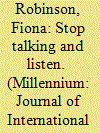|
|
|
Sort Order |
|
|
|
Items / Page
|
|
|
|
|
|
|
| Srl | Item |
| 1 |
ID:
051661


|
|
|
|
|
| Publication |
Dec 2003.
|
| Summary/Abstract |
Talk of human rights is, currently, nearly as ubiquitous as talk of globalisation. While globalisation has been described as 'the most over used and under specified term in the international policy sciences since the end of the Cold War', the same could reasonably be said of 'human rights'. Human rights are a product of the immediate aftermath of World War II, and thus they developed, in their contemporary form, in the context of the Cold War. The philosophical and political roots of human rights, of course, date back at least to the seventeenth and eighteenth centuries, and some would say even further, to the Stoics of Ancient Greece. Globalisation, too, has unfolded mainly in the late twentieth-century and has reached a position of prominence in the post-Cold War context; at this juncture, and according to popular perception, the spread of market capitalism, Western culture and modern technology fit comfortably with the death of socialism and the 'end of history'. But globalisation too has roots that date back much earlier - as early as, it has been argued, the fourteenth century.
|
|
|
|
|
|
|
|
|
|
|
|
|
|
|
|
| 2 |
ID:
105937


|
|
|
|
|
| Publication |
2011.
|
| Summary/Abstract |
This article seeks to extend feminist critiques of Habermasian discourse ethics in International Relations by engaging with the feminist ethics of care. Using the work of Andrew Linklater as a starting point, it argues that neither the existing critiques nor the responses have adequately addressed the key features of care ethics. The article critiques the idea of ethics as dialogue among 'human beings as equals' through an elaboration of several features of the ethics of care: firstly, the importance in care ethics of 'dependency' and 'vulnerability' not as conditions to be overcome, but rather as ways of being for normal human subjects; secondly, the focus on the responsibilities for listening attentively to the voices of others rather than on rights of individuals to be included in dialogue; thirdly, the need for patience and commitment in the recognition that responsibilities to others are fulfilled over the long, rather than the short, term; and, finally, the idea of care ethics as a substantive, democratic ethic of responsibility. These arguments emerge out of the basic ideas of care ethics - that relations and responsibilities of care are central to human life, and that care is a public value that must be negotiated at a variety of levels, from the household to the international community.
|
|
|
|
|
|
|
|
|
|
|
|
|
|
|
|
|
|
|
|
|